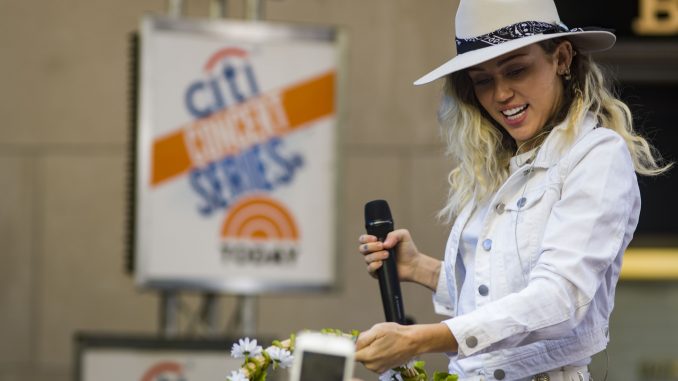
In the decade-plus since her major pop culture debut, Miley Cyrus has proven herself to be a walking, talking identity crisis. Following her rise to fame as the tween pop icon Hannah Montana and her subsequent post-Disney success with singles like “Party in the U.S.A.,” Cyrus underwent the inevitable attempt at maturation every teenybopper pop star goes through in an attempt to keep up with their aging base. The end result was Bangerz, a quasi-rebellious attempt to display just how far she’d strayed from her Mickey Mouse origins. And though Bangerz shot her to the height of her popularity, Cyrus went from childlike to outright childish, bragging about her sexual exploits and newfound marijuana habit as if society viewed these acts in the 2010s with the same degree of taboo it did in the 1950s. During the Bangerz era, Cyrus sounded less like an adult and more like a teenager demanding to be treated like an adult; it culminated in some of her worst mainstream music to date, as well as the infamous VMAs twerking travesty that garnered plenty of criticism for her alleged appropriation of Black culture.
It seemed she took the criticism to heart. After a four-year hiatus with no major music (outside of the unlistenable 90-minute SoundCloud release Miley Cyrus & Her Dead Petz), Cyrus has once again rebranded herself, this time as a wholesome, folksy pop-country singer on Younger Now. But despite transforming her musical aesthetic for the third time in her career, Cyrus is still highly lacking in imagination; like her past works, Younger Now is resigned to being a pale imitation of its genre, and ranks among the year’s worst albums as a result.
Pop-country is already a genre somewhat hampered by the disjunction between pop’s rounded edges and country’s Midwestern crudity. Like most pop-country artists, she tries to marry the commonality of simplicity that the two genres often share—whereas Bangerz and Dead Petz relied on high-profile producers like Mike Will Made It and Flaming Lips frontman Wayne Coyne, Younger Now’s personnel list consists of just Miley Cyrus and instrumentalist Oren Yoel. It would be erroneous, however, to suggest that the smaller pool of talent contributed to a more stripped-down country sound. Younger Now is as blandly over-produced as anything she’s done in the past, without any of the little musical variety afforded by Bangerz’s diverse producer list.
In fact, it’s hard to pick any individual song as a standout, good or bad, because the whole track list is so homogenous. There’s one guest performance, with Dolly Parton (Cyrus’ godmother) appearing to lend vocals (and a modicum of legitimacy) to “Rainbowland,” Cyrus’ ironically colorless utopian vision, named after her home studio. The title track, meanwhile, is an emphatic rejection of any regrets Cyrus might have been expected to have over her Bangerz phase; “Even though it’s not who I am / I’m not afraid of who I used to be,” she sings at the end of the first verse.
To Cyrus’ credit, this kind of self-reflection on Younger Now is indicative of the level of maturity that she had been striving for in the first place, but her language suggests that every new image she embodies is merely a means of escaping the last one. I’m somewhat reminded of the many personas David Bowie utilized over the course of his long career; Cyrus has a comparable scope, but with none of the self-awareness or musical adventurousness that made Bowie such an eclectic figure. Instead, Cyrus is wandering from niche to niche, trying to find a place in this vast ocean of music where she can thrive. Though she’s closer to finding that niche than she’s ever been, Younger Now is yet another misfire. Songs often bank on the same boring guitar chords and song structures, and Cyrus’ vocals are too shrill for pop music and too refined for country.
In an interview with Billboard, Miley Cyrus’ father Billy Ray Cyrus described Younger Now as “Miley leaning into her roots more than [he’s] ever heard … For her, this is honest.” If those roots lie in the half-assed, forgettable country songs that defined her father’s career, his characterization is nothing if not accurate. Before she can be honest with her audience, first she must be honest with herself. Either that, or start developing some new skills.
